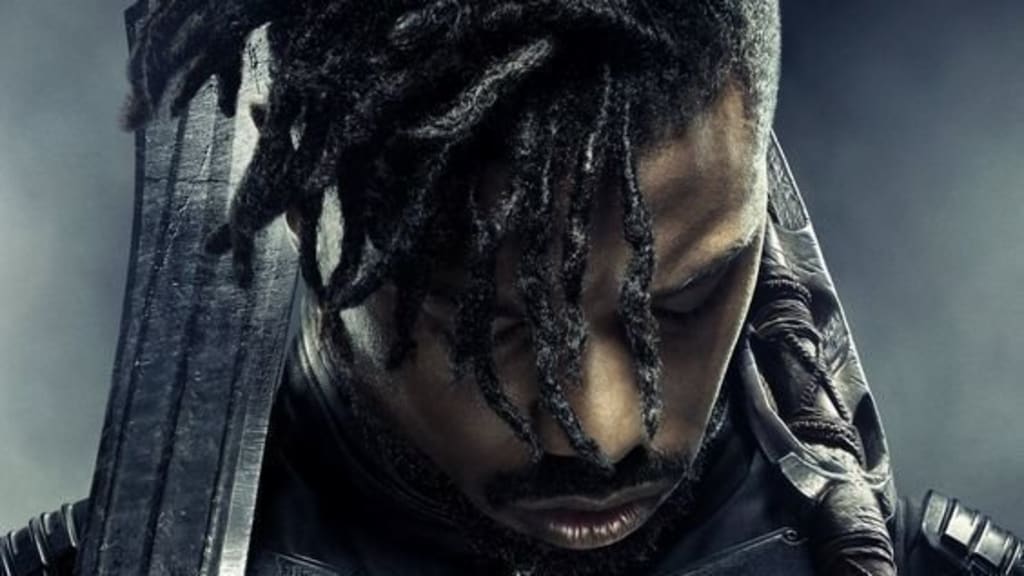An Analysis of Erik Killmonger: Why That Quote Isn't That Great
Yes. That quote.

Like most everyone, I couldn't wait to see Black Panther (2018). In fact, I went to see the movie twice. On both the first and second viewings, I cringed at Erik Killmonger's death scene; this was purely because of what he said prior to pulling the knife from his chest. After T'Challa offers to use Wakandan technology to cure Killmonger, Killmonger says this:
Bury me in the ocean with my ancestors that jumped from ships because they knew death was better than bondage.
I rolled my eyes at this line, not because the writing was bad, but because it was incredibly telling in regard to Killmonger's nature. There have been several critics and fans referring to the above quote and calling it brilliant and admirable, and a host of other positive things. The line is good in terms of the writing talents of Ryan Coogler and Joe Robert Cole, but in terms of Killmonger's thinking, it just shows how incredibly vindictive and misguided he is. Here is why:
Being "buried" in the ocean is an honor. Let's pay close attention to the diction here; Killmonger is telling T'Challa that he wants to be "buried" in the ocean. Not simply thrown in. He is expecting for his ashes to be spread into the ocean or for him to be buried in something like a casket or an urn. Killmonger is telling T'Challa to honor him despite all of the bloodshed he caused while in the military, while in Wakanda, and the bloodshed that he nearly caused all over the world by trying to weaponize black people of low socioeconomic status. He still does not understand that maybe (just maybe) there is a better way to go about attempting to claim the throne of his true home country that did not involve incriminating himself and taking the lives of several innocent people (one of whom was his own girlfriend). Killmonger's actions do not cancel out T'Chaka's murdering of N'Jobu nor does it cancel out T'Chaka's abandonment of Killmonger. His desire to help his people is admirable; his method of doing so, is not.
The implications of the two deaths are not equal. In fact, Killmonger's comparing of his death to that of his "ancestors" is a gross juxtaposition. Killmonger wants to die because he does not want the bondage that would come as a result of him being held responsible for his actions (cowardice). His ancestors did not want to be forced into a culture that viewed them as less than, beat them, and infected them with disease and chose death instead (bravery). There is nothing honorable about Killmonger wanting death instead of the bondage that he deserved for causing hundreds of deaths and advocating for millions more. Remember when he said that not only did he want his people to kill their oppressors, but that he also wanted them to killthe children of their oppressors? Killmonger seems to view death as a solution and not a problem.
The implications of bondage are not equal. When comparing his bondage to the bondage of slaves, Killmonger is victimizing himself. Of course, when Zuri and T'Chaka leave him in America with no family, he is a victim, without a doubt. But even if we count killing Zuri as evening the score, he literally threw T'Challa to the bottom of a waterfall (after stabbing him in the stomach, cutting him in several places, etc.), burned all of the heart shaped herbs in order to further assert that he would forever be most powerful, choked an old gardener, and did a number of other things that made him the criminal. This makes his bondage well deserved while the bondage of slaves came as a result of unjust capture, transport, and transaction.
Killmonger's potential bondage is well deserved and considering that T'Challa offered it in lieu of death, we can assume that it would not have lasted forever. T'Challa valued Killmonger's desire to help black people in other countries, which is evident by his initiatives at the end of the movie. Additionally, T'Challa is a fan of doing what is right, which is evident by the way that he scolded both Zuri and T'Chaka for leaving Killmonger alone in America. Finally, Wakanda is incredibly advanced in terms of their fashion, their gender equality, and their technology. We can assume that they are advanced in terms of their criminal justice system as well. In a more advanced system, they would probably focus more on treatment rather than isolation and labor, like American prisons.
I do not think that people will stop quoting this line, people love quotables (and it is a great line). However, I hope people understand that the value that they put on the line is not equal to the value that Killmonger had in mind. I hope that they understand that Killmonger's viewpoint was incredibly skewed by the anger and hatred that affected the way that he perceived himself and, in reality, the popularity of the quote seems to also reflect the way that we perceive ourselves as well.
About the Creator
Azaria Brown
25. I'm a writer and illustrator. I like films, television, books, music, politics and being black.
Reader insights
Nice work
Very well written. Keep up the good work!
Top insight
Expert insights and opinions
Arguments were carefully researched and presented






Comments
There are no comments for this story
Be the first to respond and start the conversation.